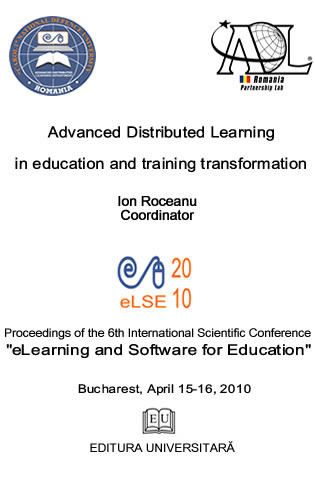E–SKILLS IN THE KNOWLEDGE SOCIETY. CONTRIBUTION OF INTEL EDUCATION PROGRAMS
E–SKILLS IN THE KNOWLEDGE SOCIETY. CONTRIBUTION OF INTEL EDUCATION PROGRAMS
Author(s): Thomas OSBURG , Olimpius Istrate, Danny Arati, Albena TodorovaSubject(s): Education
Published by: Carol I National Defence University Publishing House
Keywords: e-skills; competences for 21st Century; education policies; e-learning; Intel; education programs
Summary/Abstract: Both teachers and students participating to education in the 21st Century are using several new skills in order to build and to acquire knowledge, competences, attitudes for increasingly competitive social and professional life. Educating today for tomorrow means bringing challenges of the cutting edge of technologies, methodologies, and conceptual development in the education set-up. Together with e-skills and indissolubly connected to them, competences such as critical thinking, cooperation, communication, creativity are nowadays part of the learning acquisition, developed in advanced distributed learning environments, facilitated by competent teachers and innovative tools. Intel’s contribution is taking various forms, addressing the very core of education. Projects and programs are developed and implemented, for long periods, all over the world in collaboration with governments and development agencies. Main components of the Intel Education Initiative are targeting improvements at education policy level, in teacher training, in developing creativity in learning, and in science education.
Journal: Conference proceedings of »eLearning and Software for Education« (eLSE)
- Issue Year: 6/2010
- Issue No: 01
- Page Range: 47-54
- Page Count: 8
- Language: English

